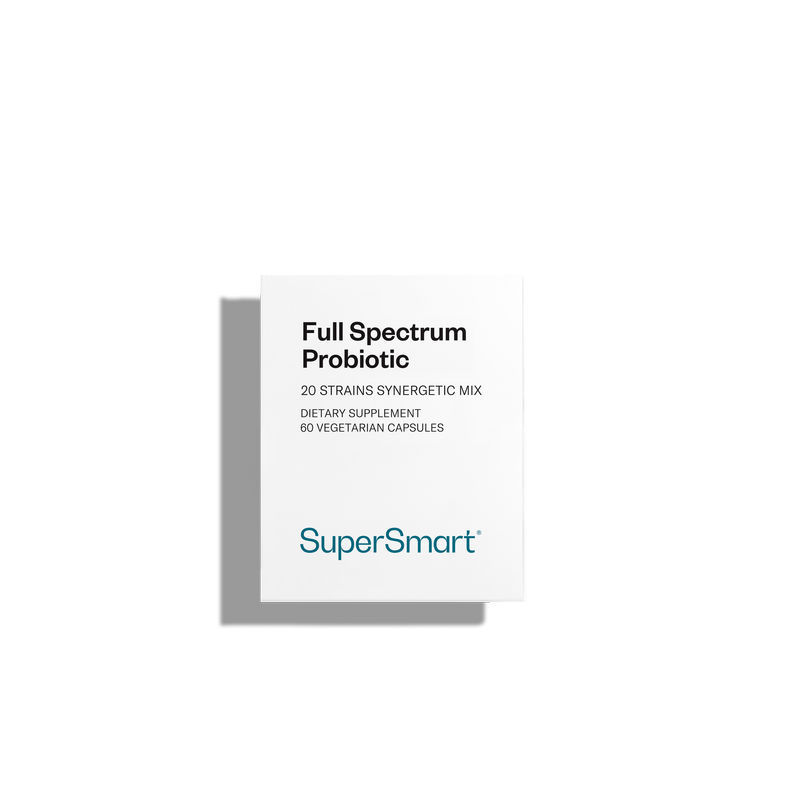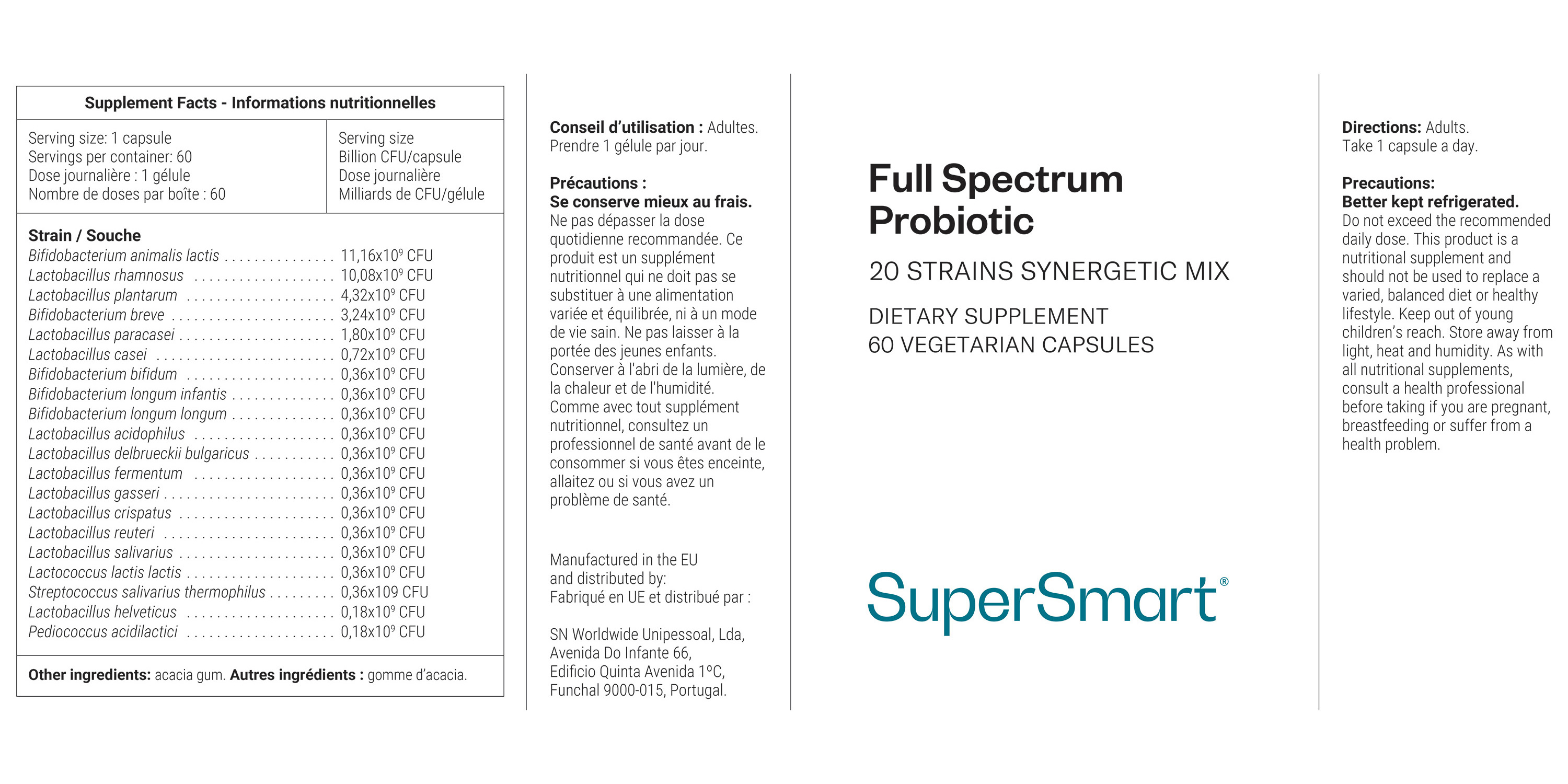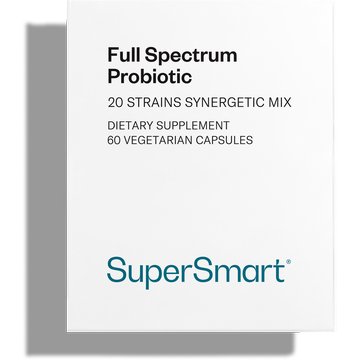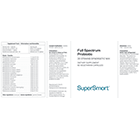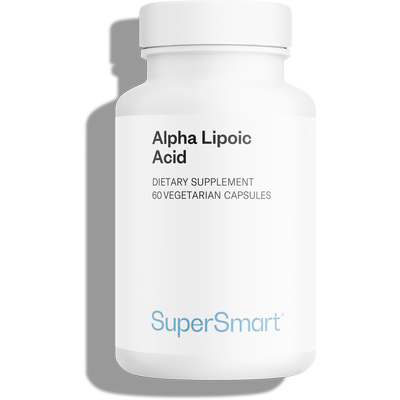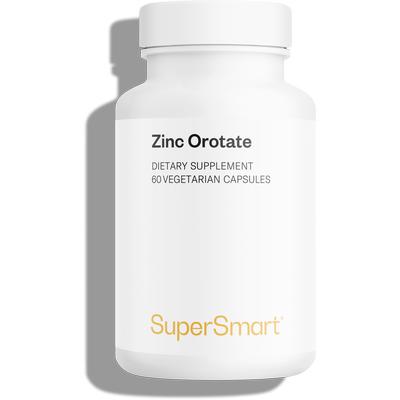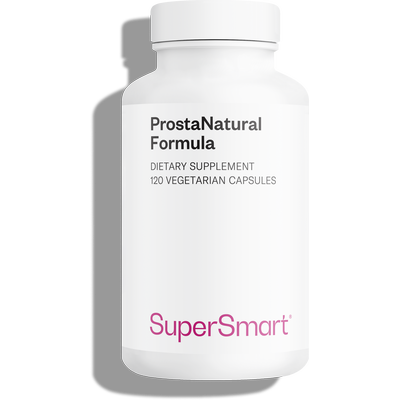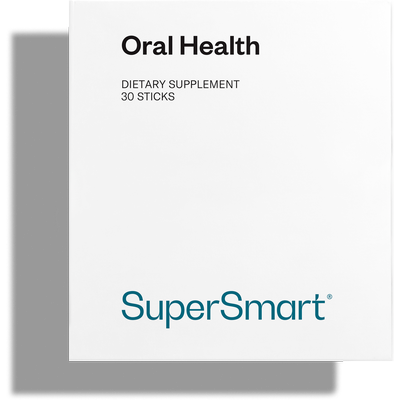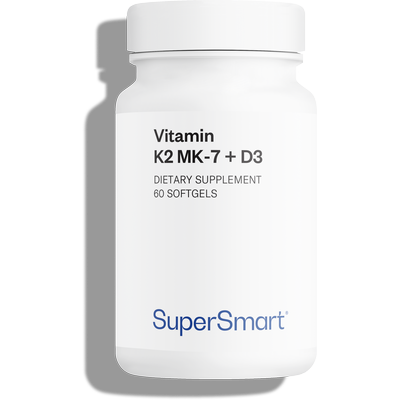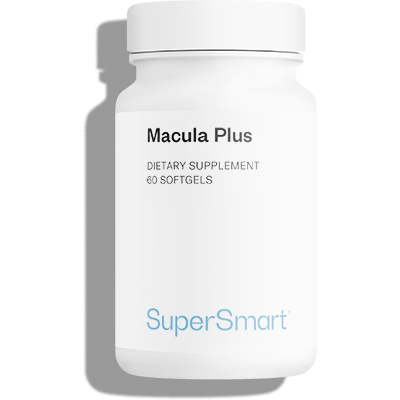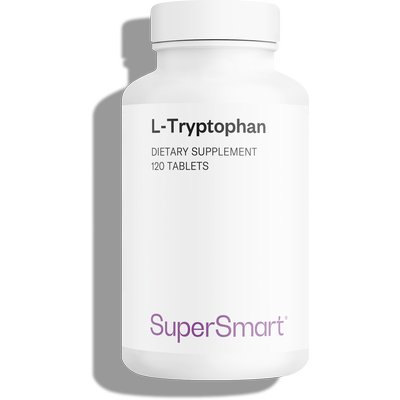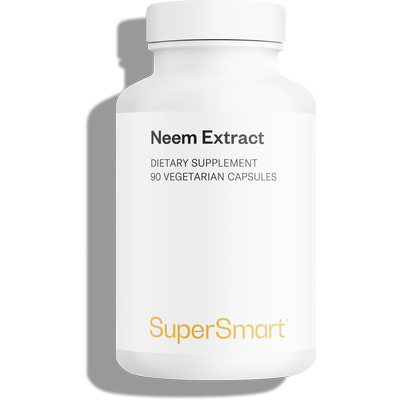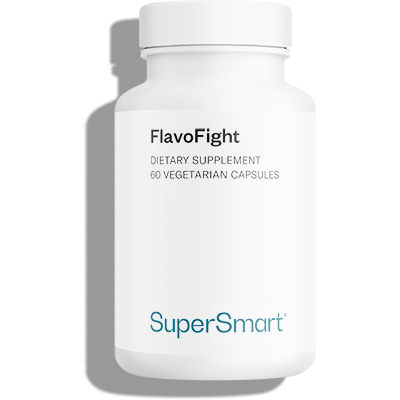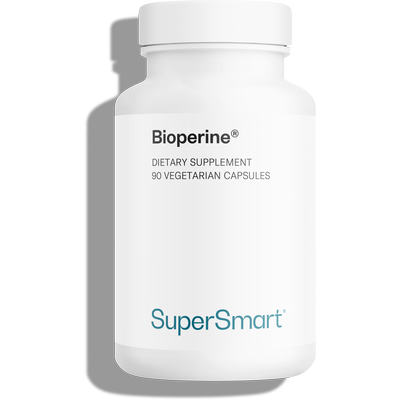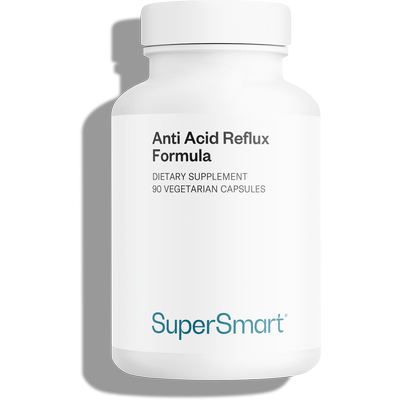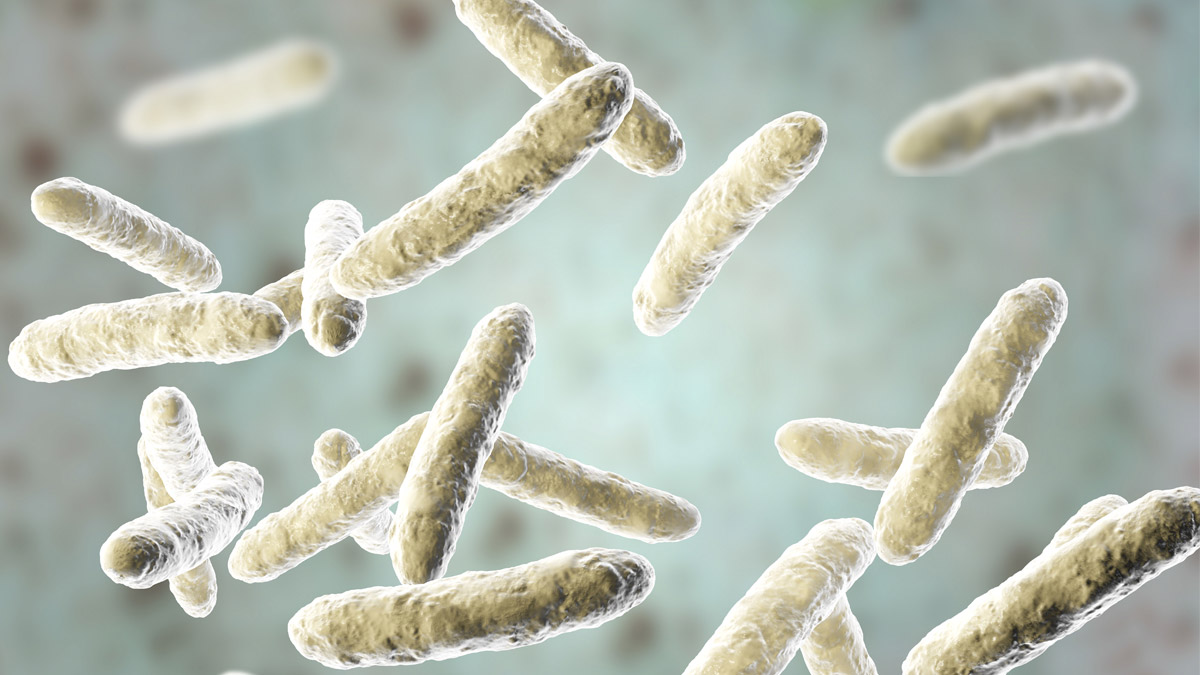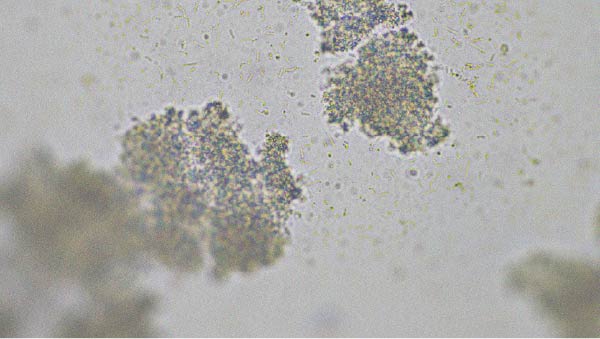In stock
Full Spectrum Probiotic
Multi-strain, broad-spectrum probiotic for the gut microbiota
Complete your selection
Full Spectrum Probiotic Formula is a unique, broad-spectrum, microbiotic supplement with a remarkably wide variety of strains (20 high-quality strains). This diversity of microorganisms, combined with a powerful dose (36 billion CFU a day), makes this an unparalleled formulation in terms of efficacy and scope of action.
The multi-strain probiotic Full Spectrum Probiotic Formula is one of our Digestion and Oro-gastro-intestinal health supplements.
What benefits does Full Spectrum Probiotic Formula offer?
A course of Full Spectrum Probiotic Formula provides you with an excellent and extremely diverse intake of beneficial microorganisms destined for your gut microbiota. The strains selected help to support not only your gut health and immune system, but also the health and radiance of your skin, as well as your mood and ability to maintain a healthy weight.
A ‘multi-strain’ rather than ‘mono-strain’ approach is more likely to be compatible with a wider range of microbiota. A full spectrum of microorganisms such as this also produces optimal effects on your gut flora and overall health.
What exactly is in this multi-strain probiotic?
The 20 synergistic strains of microorganism contained in Full Spectrum Probiotic Formula are:
- Bifidobacterium animalis lactis (11,16*109 CFU), a species of bifidobacteria identified in 1997 and frequently isolated in dairy products;
- Lactobacillus rhamnosus (10,08*109 CFU), another lactic bacteria and one of the most extensively-studied probiotics, widely-used for its ability to restore balance to the gut microbiota, and support both the immune response and skin health (1);
- Lactobacillus plantarum (4,32*109 CFU), a lactobacillus found in sauerkraut as well as in the human digestive tract which has hydrating and anti-wrinkle effects, as well as anti-inflammatory and neuroprotective ones (2);
- Bifidobacterium breve (3,24*109 CFU), an elongated bacillus, in the form of a small chain, which can lower the intestinal pH and which is particularly effective against the rotaviruses that cause diarrhoea (3) ;
- Lactobacillus paracasei (1,8*109 CFU), a species of lactic bacteria often used in the fermentation of dairy products and as a probiotic;
- Lactobacillus casei (0,72*109 CFU), a beneficial,rod-shaped bacteria found in milk and cheese, which helps to improve immunity, mood and skin condition (4-6) ;
- Bifidobacterium bifidum (0,36*109 CFU), astrain widely used as a probiotic in cases of irritable bowel syndrome and immune problems;
- Bifidobacterium longum infantis (0,36*109 CFU), a beneficial, Y-shaped lactic bacteria found in the human gut, and used as a probiotic for relieving both diarrhoea and constipation, stomach ache, bloating ... (7-8) ;
- Bifidobacterium longum longum (0,36*109 CFU), alactic ferment considered to be a good bacteria of the digestive system, also beneficial for supporting the body’s natural defences (9) ;
- Lactobacillus acidophilus (0,36*109 CFU), a beneficial microorganism found in milk, miso, etc. It promotes the uptake of vitamin K and helps maintain radiant skin. It is also widely used to combat intestinal pain and excessive flatulence (10) ;
- Lactobacillus delbrueckii bulgaricus (0,36*109 CFU), a bacillus lactic bacteria which converts glucose into lactate;
- Lactobacillus fermentum (0,36*109 CFU), part of the Lactobacillaceae family, which produces lactic acid in the body ;
- Lactobacillus gasseri (0,36*109 CFU), a microorganism present in breast milk, as well as in oral and digestive flora, which is good for gut health, immunity and weight control (11);
- Lactobacillus crispatus (0,36*109 CFU), found mainly in healthy vaginal flora and which prevents excessive inflammation of the skin;
- Lactobacillus reuteri (0,36*109 CFU), a type of lactic bacteria isolated in sourdough starter, cheese, and sausage, and the first strain to colonise a new-born baby’s digestive tract Good for the digestion, it combats pathogenic bacteria and is effective against cholesterol (12);
- Lactobacillus salivarius (0,36*109 CFU), a beneficial bacteria of the digestive tract, which improves the gut flora and various markers of the immune response (13);
- Lactococcus lactis lactis (0,36*109 CFU) , a type of lactic bacteria found in certain plant-source products such as grains and beans;
- Streptococcus salivarius thermophilus, a dietary bacteria used in particular in yogurt production;
- Lactobacillus helveticus (0,18*109 CFU), a rod-shaped bacteria, which is highly resistant and able to adhere to intestinal cells, modulate the microbiota and promote a good immune response (14) ;
- Pediococcus acidilactici (0,18*109 CFU), a strain found in fermented vegetables, dairy products and meat, as well as in the human digestive tract, and which is widely used as a probiotic for fighting pathogens (15).
What is in Full Spectrum Probiotic
Any questions?
Our team of nutrition experts and scientists has the answers.
The WHO definesprobiotics as “live micro-organisms which, when administered in adequate amounts, confer a health benefit on the host” (16). These bacteria or yeasts primarily support the equilibrium of our gut microbiota (17-19). A number of them also confer benefits for immunity and other aspects of human health (20).
In fact, the use of ‘good bacteria’ in nutrition is nothing new. For centuries, humans have enjoyed fermented foods (beer, sauerkraut, kefir, yogurt ...). Lactic fermentation actually extends the life of certain products and endows them with particular properties … because it is effective at controlling bacterial growth.
The Russian scientist Elie Metchnikoff, in observing the long lifespan of yogurt-loving Bulgarian peasants, was one of the first to realise that certain lactic acid bacteria promote good gut and immune health. Indeed, he was awarded the Nobel prize in 1908 for his work on the subject.
In the 1970s, the Japanese professor Tomotari Mitsuoka recommended oral administration of beneficial microorganisms (probiotics) for regulating balance of the gut flora. His book Intestinal Bacteria and Health (1978) remains a major reference in the field. Today’s scientists continue to follow his lead in exploring the benefits of various existing strains.
But how exactly do you produce a probiotic? You first have to select a strain from a certified list. Once the strain has been cultivated, you obtain a biomass which is passed through a centrifuge to isolate the bacteria. This is freeze-dried to ensure the survival of as many microorganisms as possible, then ground into a powder and either encapsulated or packed into sachets.
Is gut health your main focus?
If so, alongside Full Spectrum Probiotic Formula, we’d suggest taking FlavoFight. This ‘flavobiotic’ contains orange tree flavonoids which promote the formation of short-chain fatty acids in the body (28). These are absorbed by intestinal mucosa and used as a source of energy by intestinal cells. This pro-immunity and anti-inflammatory supplement provides effective support for your digestive system and especially for strengthening your intestinal barrier.
Are you also keen to support your immunity?
A course of Full Spectrum Probiotic Formula will be even more effective if you take reishi at the same time. This Japanese medicinal mushroom, known as ‘the mushroom of immortality’, was for many years the preserve of Chinese emperors and nobility. Widely studied by anti-ageing researchers, it is known for supporting the body’s immune defences(29-30). For optimal results, choose an extract standardised to 20% polysaccharides and 6% triterpenes, such as Reishi Extract.
Would you like to have healthier, more radiant skin?
Then in addition to the beautifying effects provided by Full Spectrum Probiotic Formula, benefit from those offered by the supplement Daily Beauty. This beauty formulation combines the best nutrients for the skin, hair and nails: collagen peptides, solubilised keratin, biotin, avocado oil, vitamin B3, zinc... Everything you need to enhance your beauty assets and always look your best!
You simply need to take one vegetarian capsule of Full Spectrum Probiotic Formula a day.
We recommend taking this broad-spectrum probiotic in the morning with a glass of water, before you have breakfast.
Alongside supplementing with this probiotic, we’d suggest taking these additional steps to support your intestinal system, immunity and skin:
- eat a varied, balanced diet, the key to good digestion, strong immunity and a radiant complexion (21-22) ;
- stay well-hydrated, as water facilitates intestinal transit;
- make sure you get enough sleep(at least 7-8 hours a night), because even just one sleepless night is enough to weaken the immune system by reducing the number of certain white blood cells (23) ;
- take regular breaks, as stress and overwork impair intestinal transit and immunity, and accelerate skin ageing (24-25) ;
- take regular, moderate exercise as it activates the digestive organs, optimises the circulation of antibodies and promotes the elimination of skin impurities, blackheads and acne through perspiration (26-27).
This product’s capsules are composed of HPMC (hydroxypropyl methylcellulose), a plant substance derived from cellulose. HPMC is widely used for medicines and dietary supplements. It contains no animal ingredients, is recognised as safe by health authorities and is considered more sustainable than synthetic alternatives.
october 20 2025
Es genial
march 2 2024
correspond à la description
november 4 2023
Digestion et confort intestinal parfait ! Ca marche!
july 7 2023
Your products are good.
january 11 2026
Nach der Einnahme von dem Full Spectrum Probiotic hat sich bei meinem Mann sehr gut sein Verdauungsprozes normalisiert. Abgesehen davon konnte ich bei ihm auch eine positive mentale Wirkung feststellen.
After taking the Full Spectrum Probiotic, my husband's digestive process has normalized very well. Apart from that, I also noticed a positive mental effect on him.
 see the translation
Translated by SuperSmart - see the original
see the translation
Translated by SuperSmart - see the original
Need help?
You may also like
of experience
your money back
##montant## purchase

